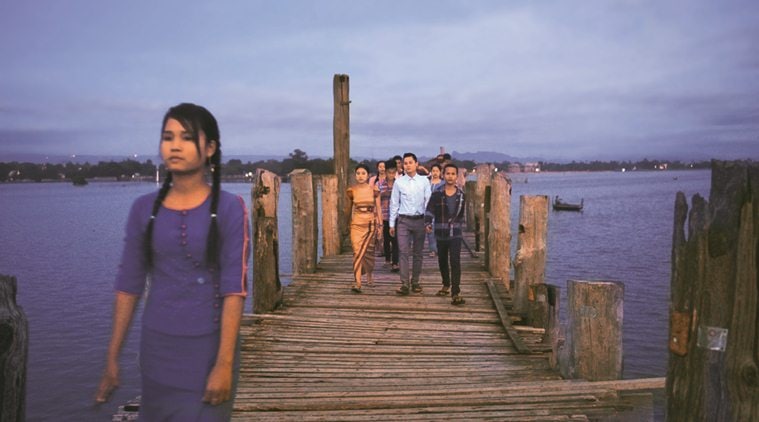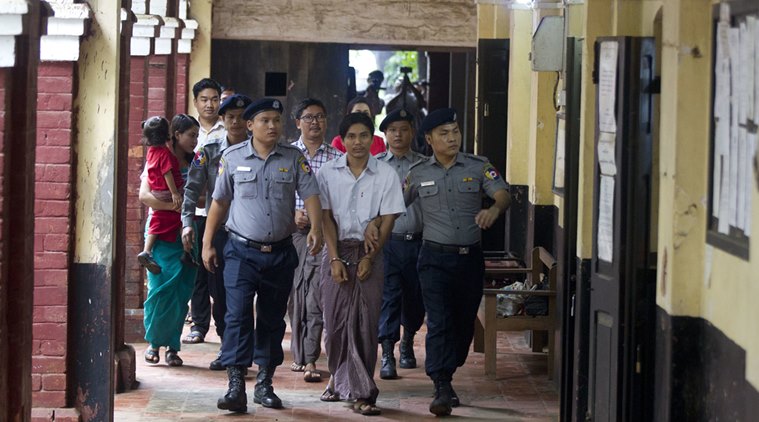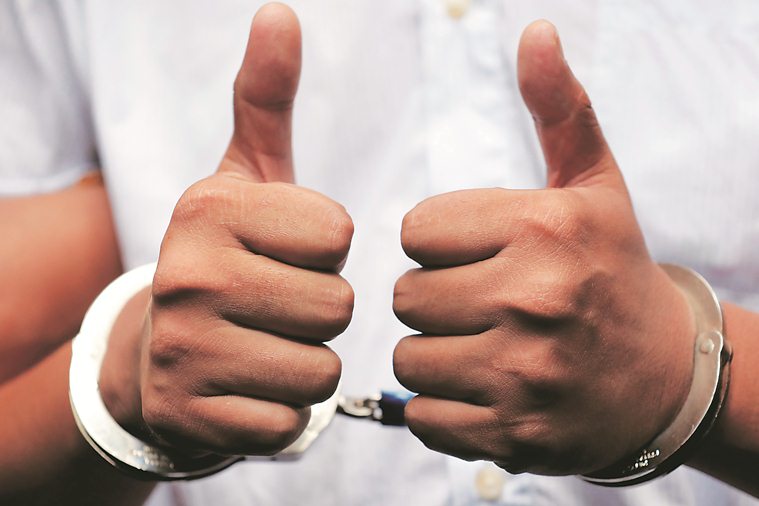
Reuters reporters sentenced in Myanmar
IN a crowded cafe in the A K K Mall in downtown Yangon, squeezed on a table between strangers, a pro-democracy activist looks around warily and warns that talking about the Rohingya in a public place is not a good idea. He says it would be better to use the letter R (for Rohingya) and B (for Buddhists) while discussing the matter.
In the office of his newly established People’s Party, Ko Ko Gyi, a leader of the anti-junta 1988 student uprising, and of the group that calls itself the 88 Generation after that uprising, who broke away from Aung San Suu Kyi’s National League for Democracy (NLD) over differences during the 2015 election, insists the term Rohingya is a fake identity for migrants from Bangladesh.
In Mandalay, a monk out on an evening stroll on the U Bein teak bridge says monks and students fought for democracy and human rights in Myanmar but does not comment when asked about citizenship rights for the Rohingya.
READ | Two Reuters journalists investigating Rohingya killings jailed for 7 years by Myanmar court
 On the U Bein teak bridge at Mandalay. (Photo: Neeraj Priyadarshi)
On the U Bein teak bridge at Mandalay. (Photo: Neeraj Priyadarshi)
But there is little meeting ground between the world and Myanmar on the issue of the Rohingya in the Rakhine state, their persecution, and their flight.
READ | What is the Myanmar official secrets case?
Nobel Laureate Aung San Suu Kyi has lost much of her global aura for appearing to defend the Myanmar military on the Rohingya issue and for not standing up for the democratic rights of the two journalists but democracy activists said the international onslaught against her was only empowering the military and extremist nationalist forces and endangering their democratic transition.
“The international community blames the lady too much. I understand that they blame the military, but why do they blame the lady,’ said Kyaw Min Swe, Editor of The Voice, a daily newspaper, and Executive Director of the Myanmar Journalism Institute.
Suu Kyi, who holds the office of State Counsellor and foreign minister, but is regarded as the de facto head of the government, is referred to almost by everyone in Myanmar as “the lady”.
 The two reporters, Kyaw Soe Oo and Wa Lone had been reporting on the crackdown by the Myanmar army on Rohingya Muslims in the Rakhine state. (AP Photo/Thein Zaw)
The two reporters, Kyaw Soe Oo and Wa Lone had been reporting on the crackdown by the Myanmar army on Rohingya Muslims in the Rakhine state. (AP Photo/Thein Zaw)
“I disagree with the policies of NLD, “ says the senior journalist, “but Aung San Suu Kyi is walking a tightrope with the military and the civilian government does not have direct responsibility for many things happening in this country. She is the only person we have right now. If she falls, our democracy will fall. Whether we like it or not, we have to support her. “
Last year, Swe was arrested for publishing a satire about the military and spent two months in prison. He said his case was being “directly controlled” by the military which later withdrew the charges against him and three others from other news outlets arrested for “online defamation” under the country’s Telecommunication law.
“All Myanmar journalists stand with the two Reuters journalists. They were carrying out their professional work, and they should not be punished for this,” said Swe, pointing to the bunch of regressive media laws that curtailed press freedom in the country.
But, he said, the international media was projecting “biased” and “one-sided” reports “with dramatic presentations” of a complex situation in the Rakhine that he said was more about migration than communal conflict.
Swe said there was no doubt that the military had committed a grave wrong in Rakhine as reported by the two journalists.
 Reuters journalist Wa Lone as he is taken away from a Yangon court to prison Monday. He and colleague Kyaw Soe Oo were jailed for 7 years under the official secrets law for reporting on abuses against the Rohingya in Myanmar. (Reuters Photo)
Reuters journalist Wa Lone as he is taken away from a Yangon court to prison Monday. He and colleague Kyaw Soe Oo were jailed for 7 years under the official secrets law for reporting on abuses against the Rohingya in Myanmar. (Reuters Photo)
“But the international media is purposely trying to distort the good work done by Aung San Suu Kyi for freedom and democracy in Myanmar,” he said. “The lady is facing pressure from two sides — from the international community, and from the military”.
Myanmar reflects some key trends from the region: India’s paranoia about “illegal migrants from Bangladesh”; how Sri Lanka’s Theravada Buddhist majority view the Rohingya issue as one of national security and sovereignty; and Pakistan’s bruising military-civilian imbalance in favour of the men in uniform.
Except that unlike in Pakistan, where the military runs the show from the shadows, in Myanmar the Tatmadaw or the military, has institutionalised its role in politics and governance through the 2008 Constitution.
The NLD, which won a landslide victory in the 2015 election, shares power with the military, which has 25 per cent seats reserved for it in Parliament and gets to head the ministries of defence, internal security or home affairs, and border affairs, and through these, virtually much of government both at the centre and in the provinces.
And unlike Pakistan, where the civilian leadership has a history of positioning itself against the military, Aung San Suu Kyi wants a “national reconciliation” between the military, civilians and the ethnic groups in the country.
“This is our political reality,” said Kyaw Zaw Moe, editor of the Irrawady, an English-language monthly. The Rohingya issue was hardly a creation of the civilian leadership in a country that has been ruled by the military for over six decades, he said, but it was taking the rap for it.
“The whole country is suffering because of it, in terms of our image, our democratic integrity, our economy and development, our human rights,” said Moe, who spent eight years in prison in military-ruled Myanmar, and a further eight in exile in Thailand’s Chiang Mai, where his brother Aung Zaw, had founded the publication, returning to Myanmar only two years ago.
“The international community must understand that Aung San Suu Kyi is also walking a tightrope. We have to be very careful, it is a delicate and complicated situation,” he said. The singling out of generals for sanctions by the US was a sign that the world may be starting to understand this, he said.
Direct criticism of Suu Kyi’s strategic silences on the Rohingya issue or the lack of support to the jailed journalists from her or the elected government is rare.
Yin Yadanar, manager of Free Expression Myanmar, is an activist who disagrees that the civilian leadership must not be pressured.
“We already expected this negative verdict (against the Reuters journalists). Everyone — including the government — knows this is a travesty of justice. The government is complicit. Yes, it is true that the relevant ministry is run by the military, and, yes, it is true that judges are aligned with the military. But our government has a majority in parliament, the ability to pardon, and moreover, has moral power. Immediately pardoning the two journalists is a start but not enough — there needs to be total reform of the old British colonial law. Those politicians who have spent years decrying military censorship need to start acting,” she said.
“Our people have already sacrificed a lot, we are really tired. We are only asking our government to stand with us. We want her (Suu Kyi) to stand with the people to protect the country”.
The rise of Buddhist nationalist groups has created its own concerns. While Yin Yadanar criticised the government for being too quick to act against anti-Buddhist hate speech and not doing enough to rein in those who spoke against minorities, Irrawady editor Moe pointed to the rise of groups such as Ma Ba Tha (Association for the Protection of Race and Religion) as no coincidence.
Blamed for fomenting violence against Rohingya and fanning a wider anti-Muslim sentiment, it has been banned, but its members remain active.
Swe, the editor of The Voice, alleged that the Ma Ba Tha was a deliberate creation of the Army that sought to interrupt Myanmar’s transition to a full democracy. “The military and its Union Solidarity and Democratic Party, they are planning so many things to take back power from NLD. They never give up,” he said.
The international censure of Myanmar, said Swe, was also driving the country back into Chinese arms. “Myanmar people, we don’t like China – it has too much alliance with the military. But that is changing. Now China seems like our only friend,” he said.
source: https://indianexpress.com
